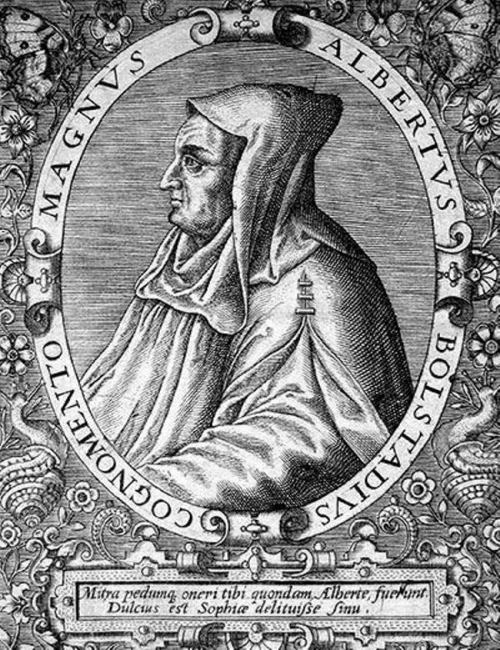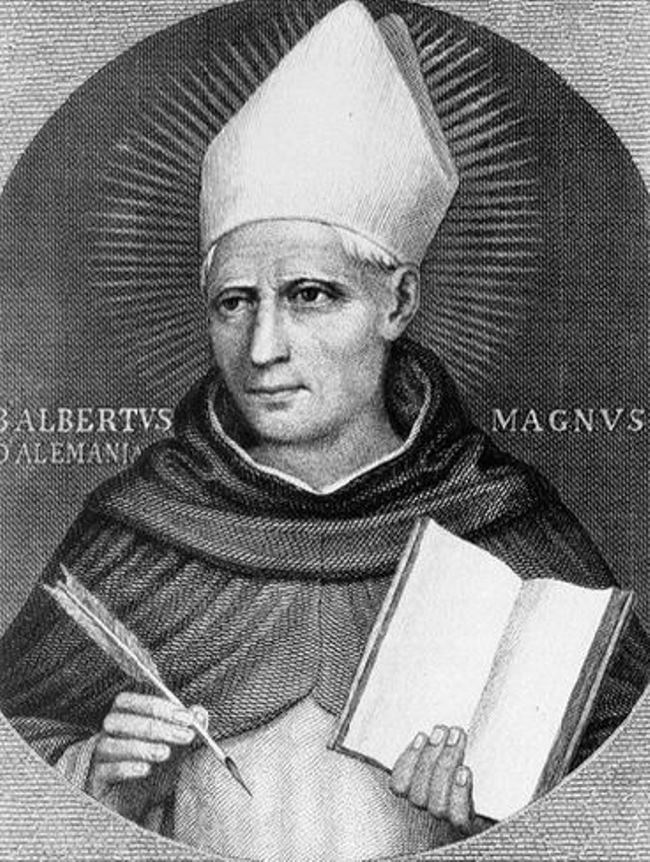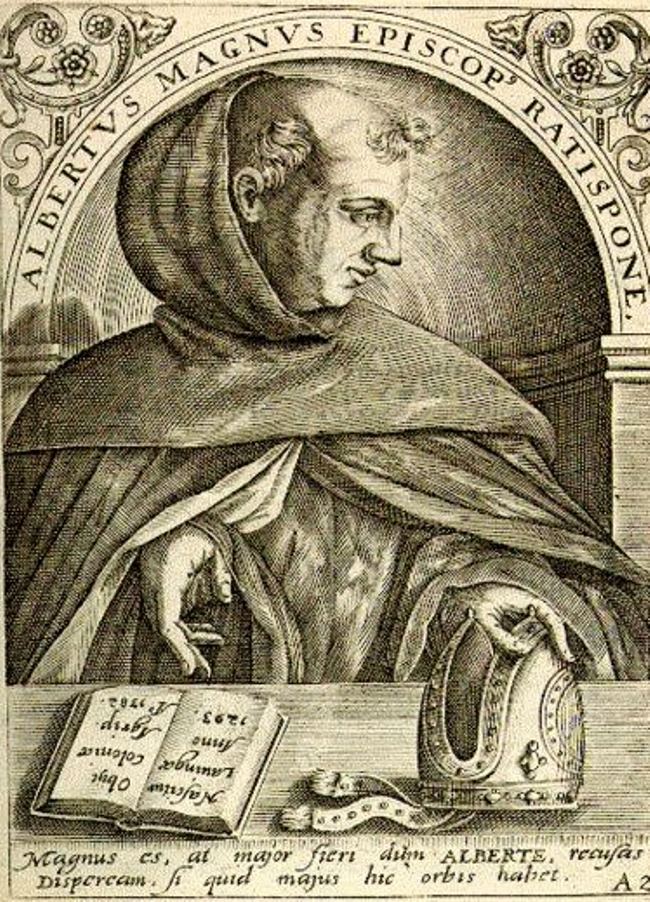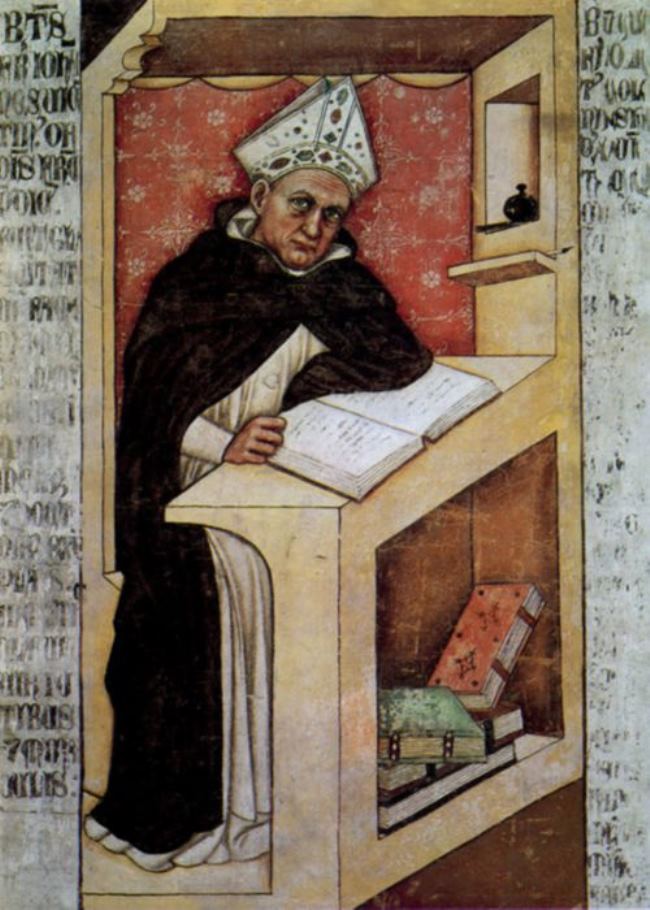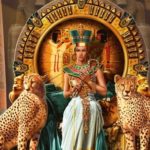Albertus Magnus – Albert the Great
There are few figures in the history of the Western European Middle Ages who were worshiped by the contemporaries during their lifetime. Death only promoted the growth of the already great glory.
Albert von Bollstedt was born in 1193 into a wealthy family in the small Bavarian town of Lauingen. As a child, Albert didn’t have any outstanding abilities that would indicate his bright future. However, little Albert had one passion: the future scientist and theologian had thirst for knowledge.
There is a legend that survived Albert for centuries. Once, Blessed Virgin appeared to the young man during his hot prayer and asked him what science he wanted to succeed in. Albert wished to achieve success in studying the queen of sciences – philosophy. Nodding, the Mother of God said with sadness: “I will fulfill your request – you will become a great philosopher. But, alas, you’ve chosen philosophy not theology. And it is theology that deserves the greatest preference over all other sciences, for there is nothing more beautiful than comprehending the greatest wisdom of our beloved God. As punishment for the lack of piety, you will return to your previous stupidity before your death.”
I must say that this legend was spread at a time when Albert the Great was at the zenith of his fame and reverence. However, it began to be passed from mouth to mouth with new force, when in 1278, during a lecture at the department of the Regensburg University, Albert suffered a stroke, which caused his senile dementia. The great scientist completely lost his memory and ability to show little willpower. According to modern psychiatrists, Albert the Great suffered from Pick’s syndrome or Alzheimer’s disease in the last two years of his life. However, this materialistic view of the last stage in the life of the philosopher did not shake the confidence of Albert’s followers in the divine fulfillment of the words of Virgin Mary.
The surprisingly long life span of Albert the Great, who was 87 years old, gave scientists the opportunity to put forward the suggestion that the famous German owned a philosopher’s stone at the end of the 13th century. Indeed, Albert was actively interested in the occult sciences and alchemy. Thus, in his 20-volume collection of works, first published in 1651, which included works on geography, ethnography, physics, chemistry, occultism and theology, three works are devoted directly to alchemy.
Among the many students of Albert in his Cologne period was Thomas Aquinas himself – who later became the greatest philosopher and theologian of the Roman Catholic Church. In one of his later works, Aquinas claimed that in 1240 he witnessed how Albert the Great had turned mercury into gold before his eyes. Students of Albert tried to repeat the experiment but failed to achieve the desired result. The same Thomas Aquinas suggested that Albert managed to create a homunculus – an artificial person, with the help of a philosopher’s stone. However, at the insistence of the church scientist was forced to destroy his amazing creation.
Albert managed to become an outstanding researcher and inventor, whose discoveries were long ahead of their time. So, there are memories of a mechanical bird made of pure gold, which could sing as a nightingale and fly from branch to branch. For this bird, the king of Bohemia offered Albert a fabulous sum of money, but the scientist refused to part with his creation. Also he created special lifting mechanisms for the royal silver mines in Bavaria and it was not necessary to use the physical strength of people and horses traditional in those years.
According to some reports, scientist built a giant greenhouse from an unknown material and created an artificial garden, all processes in which were carried out by an unknown force. In particular, they say that Albert the Great decided to buy a piece of land belonging to the Dutch King Wilhelm II to build a monastery. But the ruler refused. Once, during the King’s trip to Cologne, Albert invited the crowned guest to a feast in his honor. As it happened in the winter – January 6, 1249 – the king was unpleasantly surprised that the tables stood outside in the open air. However, as soon as Wilhelm and his suite sat down at the tables, the sky suddenly cleared, the icy wind stopped blowing and the long-awaited sun looked out. The snow melted in a few minutes, flowers appeared on the glade, and buds appeared in the trees. Struck by what he saw the king agreed to a deal, and when dinner was over, winter returned: snow began to fall, flowers faded and buds fell off…
In dreams and in reality, Virgin Mary and angels often came to him and gave ideas for new discoveries and inventions, and even lifted the veil over the future. In his book Oracles, written in the second half of the XIII century, Albert revealed amazing prophecies that spanned a thousand-year period of world history. His predictions are concrete and Albert said that there would be walking machines and man would fly to other planets and other worlds. According to the scientist, the flight to the moon will take place 700-800 years after his death. The world is divided into three huge states. There will be a conflict between them, which may result in a bloody war. And only after the giant ancient island shows its peaks from the waters behind the Pillars of Hercules, the world will finally come to peace…
Shortly after his death in Cologne in 1280, Albert the Great was canonized by the Roman Catholic Church. And the works of the renowned scholar of the Middle Ages became reference books for the majority of the enlightened minds of Western Europe.
